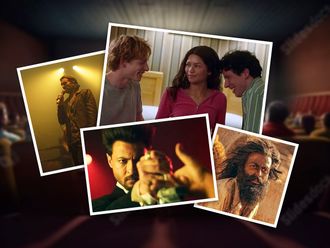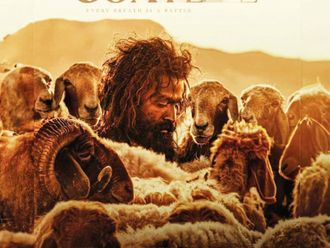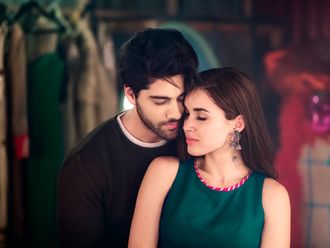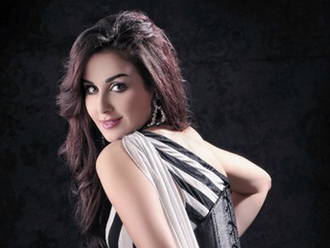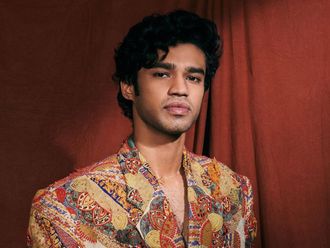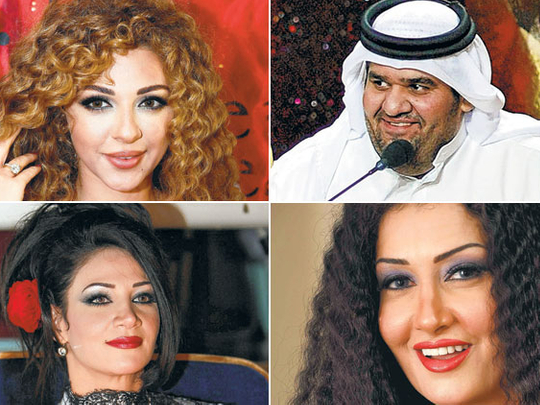
'My duty is to please my fans'
Myriam Fares is not only a talented singer, actress and dancer — she is also proving herself to be a very successful businesswoman. After parting ways with music production company Melody following the release of her 2008 record Betoul Eh, the 28-year-old Lebanese superstar is back with a new album, the first to be released by her own production company, Myriam Music.
And in a bid to appeal to the GCC market, the new album, Min Oyouni — her fourth in her career — only features Khaleeji and Moroccan-influenced songs. Yes, there's not a single Lebanese track in the album.
But that's not all, Fares has also become the first singer to embrace digital media to coincide with the release of the CD. Clearly aware of the power of social media and the age demographic of her fans, Min Oyouni features a QR code that can be scanned using an iPhone or iPad after which fans are given exclusive access to videos, images, tunes and messages from the star herself.
Fares was in Dubai recently to launch her new album, distributed by EMI Arabia. Dressed in Dolce & Gabbana with shoes by Louis Vuitton and jewellery by Cartier, Fares talked about her latest project.
Excerpts from the interview.
Tell us about your new album.
I am so happy with this new album. This is my first Khaleeji project and contains songs that have a flavour of Morocco, Iraq and the rest of the Gulf. The first single is Khalani, I shot this music video last year, and it was directed by [the late Lebanese director] Yehya Sa'ade. It's a really exciting project. I decided to dedicate an entire album to Moroccan and Gulf music after the success of my first Khaleeji single Mukana Wayn. It proved to be very popular with my fans in the region.
Were you hesitant about releasing an album that did not contain a single Lebanese song? Were you worried that fans would accuse you of trying to outshine female singers who actually come from the Gulf?
I am a performer, and although I am Lebanese and very proud to be from Lebanon, I also consider myself an Arab female, and I love all cultures from the Arab world. I like being able to showcase different styles and dialects in my songs, and considering I perform all over the region, I think it is important to cater to all of my fans and provide a little bit of everything.
A number of artists have postponed the release of their upcoming albums due to the current situation in various countries in the Arab world. Were you not hesitant about releasing an album?
I was not hesitant. The proof of the album's success is that it is already No 1 in the Virgin Megastore Top Ten, so it is already selling very well. We need to carry on and continue to entertain people.
There's some controversy surrounding your song, Atelah, with Moroccan singer Sofia Marrikh criticising you, claiming that the word is offensive. What do you have to say?
The song was not controversial in Morocco, and everyone did not have a problem with it. It was only one person that had a problem with it. I cannot personally comment every time a single person praises or criticises my work — there are those that love you and those that do not. As long as the majority like what I do then great. I would only respond if I have a large group of my fans pointing out something they do not really like. Everybody has their own opinion, but my duty is to please my fans.
You're the first Arab artist to combine digital media with an album release. How did this come about?
I am always connected and I believe that it is very important to embrace social media. Most of my fans like using the internet, so we thought this would be a great way of connecting with everyone. I will work hard towards constantly uploading new content and linking in with visitors to my website.
Arabia Online
"I am so happy that everyone likes [new film] Bebo w Besheer — it shows that we can make rom-coms without completely exaggerating everything in the script."
— Egyptian actor Asser Yassin
Hussain in trouble
Hussain Al Jassmi has apparently landed himself into hot water with record company Rotana.
According to reports, Rotana's board of directors have unanimously agreed to sue the Emirati superstar for breaking the terms of his contract by releasing a number of singles and selling them to different radio stations without obtaining consent from the Saudi record company.
The decision to sue Al Jassmi comes after both parties reportedly attempted to reach a mutual agreement. However, negotiations have appeared to have reached a dead end after Al Jassmi said he did nothing wrong.
Meanwhile, sources close to the singer have said that Al Jassmi was forced to produce a number of singles himself as Rotana is repeatedly delaying the release of his new album.
Hate me, love me
Somebody should tell Gada Abdul Razeq to take a break from the public spotlight. The attention-seeking, media-obsessed Egyptian actress has complained to Arabic reporters that over 70 per cent of stars from the Egyptian entertainment world do not like her.
In an interview this week, Abdul Razeq hit out at Egyptian actor Amr Waked for blacklisting her after he created a list of actors who opposed the Egyptian revolution. "He just did it to increase his own popularity, but I don't know why my colleagues in the industry don't like me," she said. "I never insulted the protestors during the events of January 25. I simply expressed my concern for the security of the country now that we do not have a president."
Diana for peace
The International Human Rights Commission (IHRC) has appointed prominent Lebanese singer Diana Haddad as Ambassador of Peace. Haddad will be taking part in numerous humanitarian and charitable activities that are part of the IHRC's agenda in the Arab world.
Asra Khan, senior vice chairperson of IHRC's headquarters in Islamabad, said: "Diana Haddad will be one of our humanitarian and Peace Ambassador[s]. She'll be giving public messages over the print and electronic media for peace, which is most important for whole world.
"In this regard, IHRC and affiliate organisations will organise full media movement, and her face will be focused with the message of peace, humanity, women empowerment and love for everybody."






